2025: The Year SAP Generative AI Redefines Middle East Careers

NOEL BENJAMIN D'COSTA
I hope you enjoy reading this blog post. If you need any advise, please do not hesitate to reach out by clicking here
Since 2020, there has been skyrocketing growth of Artificial Intelligence (AI) in Enterprise Resource Planning (ERP) systems as it has changed the way businesses work. In its infancy stage, the role of AI was initially that of task automation and simple analytics. Over the past four years, it has expanded massively to predictive analytics, intelligent automation, personalized insights, and several other areas.
Key Takeaways
SAP Generative AI is reshaping Middle East careers in 2025. Here are six key takeaways:
Emerging Roles: New positions are developing at the intersection of SAP and AI, offering fresh career paths.
Skill Demand: There’s a growing need for expertise in AI integration within SAP systems.
Industry Adoption: Sectors like oil and gas, retail, and healthcare are leading in implementing AI-driven SAP solutions.
Career Advancement: Professionals with AI and SAP skills are finding enhanced opportunities for growth.
Educational Focus: Training programs are increasingly emphasizing AI competencies alongside SAP.
Job Market Evolution: The employment landscape is shifting to value AI proficiency within SAP roles.
For a more detailed exploration, you can read the full article here
SAP Generative AI in ERP Platforms
The potential for SAP Generative AI transformation has stemmed from the emergence and subsequent evolution of AI technologies, which have become embedded in ERP platforms.
The early years of AI adoption were dominated by large enterprises that used it to maximise their operations and improve production efficiency. Organizations that leverage AI-enabled ERP tools, used them to improve supply chain efficiency, customer relationship management, and financial processes.
In 2023, the adoption of AI in ERP systems gained even more traction as mid-market companies started implementing AI based solutions as they saw the value in it. Automation, IoT and advanced analytics were driving this change enabling technology available on cloud-based ERP platforms which lowered the adoption cost.

In 2024, AI has now become an integral part of ERP solutions as it now supports quicker decision-making and strategic planning. AI-enabled ERP solutions are being utilized by industries such as manufacturing, retail, and healthcare to predict market trends better, improve inventory handling and optimize workforce distribution. Moreover, advancements in natural language processing (NLP) and machine learning have enabled ERP systems to analyse unstructured data like emails or social media interactions to drive insights.
The widespread adoption of AI features in ERP systems highlights its transformative potential, enabling organizations to navigate the complexities of an increasingly data-driven world.
Below is a graph illustrating the global ERP software market size and the corresponding growth of AI adoption in ERPs:
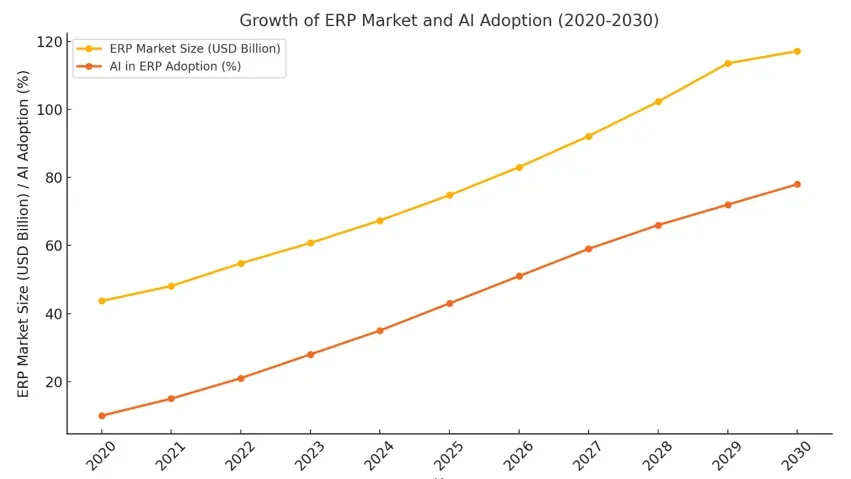
Sources:
- Allied Market Research: “ERP Market Size, Share | Industry Forecast – 2030” Link
- Grand View Research: “ERP Software Market Size, Share & Growth Report, 2030” Link
- MarketsandMarkets: “AI in ERP Market Trends & Forecast” Link
Key Insights:
- The adoption rate of AI in ERP systems is projected to grow significantly from 10% in 2020 to 78% by 2030.
- The steady increase in ERP market size indicates sustained demand for advanced functionalities, with AI playing a central role in driving this growth.
The Role of AI in Transforming SAP Careers
Not only is AI changing the way SAP professionals or professionals that use SAP, do their job, but it is also generating new job positions and redefining many traditional ones. For example, the demand for SAP jobs with AI integration is now 30% higher than two years ago and is only expected to increase. Companies embarking on a Digital Transformation journey or specifically an SAP Implementation, would like to have teams who have AI expertise.
There has been an increased demand for AI integration into SAP. The reason is simple – it improves workflows, speeds up automation, and provides actionable insights for better decisions.
The Focus on the Middle East
Artificial Intelligence is the next big thing for the Middle East, where it has brought a massive transformation – especially in the Oil and gas, Retail and Healthcare verticals and they have benefitted early.
Forward looking organizations have now started to use AI to optimize operational efficiencies, strengthen customer experiences and drive data-powered decisions in these sectors. The job market, and especially SAP careers, can be positively impacted by AI so much more.
The integration with AI also opens exciting career opportunities for veteran SAP Consultants, and Developers wishing to upskill, and those new to the world of SAP. Be it from a perspective of predictive analytics to intelligent automation, the opportunity for scaling and advancement is massive. This is an opportunity of a lifetime for any SAP ERP Consultant, just like me!

Now AI could be misinterpreted as being difficult to implement, but actually with the right skills, it would help business professionals to start focusing on strategic tasks while machines are handling the repetitive elements.
Such a transformation is making SAP careers much more dynamic and rewarding. With the rise of AI as a strategic enterprise level asset in SAP systems, experts are very much needed to drive innovation and growth across industries.
As we dive deeper, we will examine how AI is changing SAP roles, the skillsets in-demand and industries driving these changes throughout the Middle East.
The Role of AI in Transforming SAP Careers
We all know that the focus of every business is around Finance, Procurement, HR, Sales, and IT. AI is transforming SAP careers across these areas. The integration of AI with SAP systems is not only enhancing traditional roles but also creating specialized opportunities within these domains. Here’s how AI is making an impact:
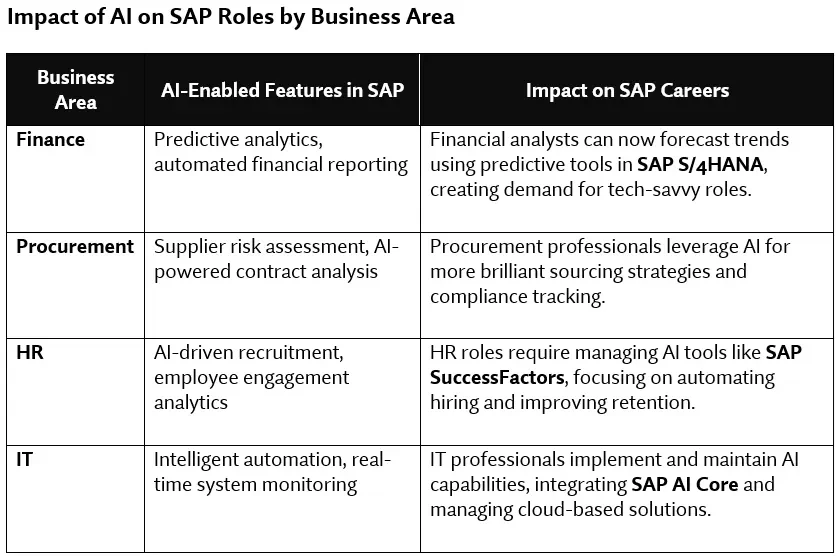
Other topics of Interest
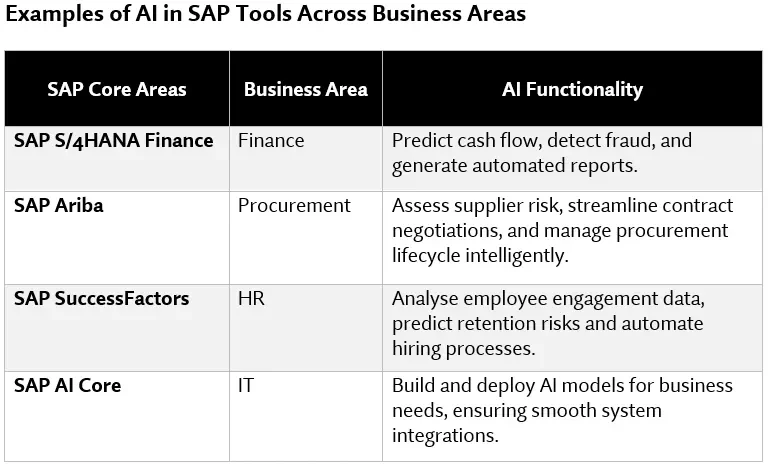
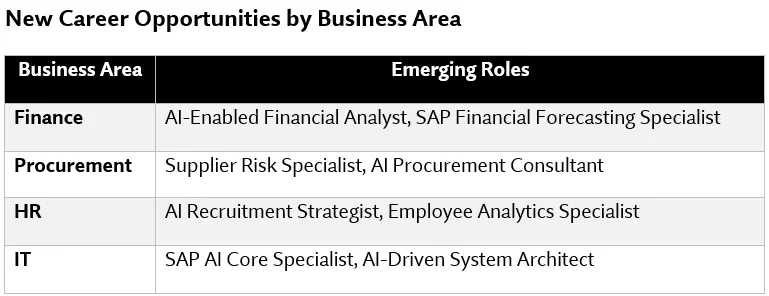
By integrating such highly designed functions for business needs, AI creates completely new SAP roles. SAP will force Finance, Procurement, HR and IT professionals to expand their knowledge of AI, in order to succeed.
Therefore, they will need to spend more time learning the basics of AI as well as going deeper into specific functional areas involving AI along with SAP Tools. This highlights the need for SAP solutions integrated with AI, enabling businesses to adapt, compete, and expand their market presence.
Emerging SAP Generative AI Career Opportunities
AI integration is driving demand for specialized SAP roles across the Middle East. Businesses are actively hiring professionals to implement and maintain AI-driven SAP solutions, creating opportunities in the following areas:

- AI Specialists focus on implementing predictive analytics and machine learning into SAP systems.
- Data Analysts extract insights using SAP analytics tools, helping businesses improve decision-making.
- Integration Engineers ensure seamless SAP data integration across platforms, which is vital for smooth operations.
Freelancing is also becoming popular, with companies seeking short-term AI and SAP integration expertise. Industries like retail and healthcare rely on freelancers for specialized projects, offering flexibility and diverse opportunities for professionals. As demand for AI-SAP roles grows, those who align their skills with these emerging opportunities will thrive.
Skills in Demand for SAP-AI Careers
Succeeding in AI-driven SAP solutions requires mastering both technical and soft skills. Here’s a breakdown of the skills needed across different business areas:
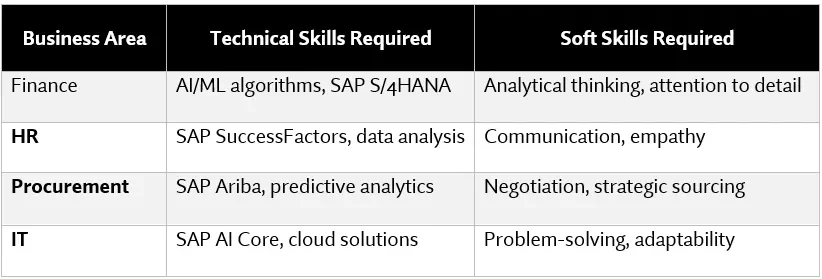
Technical skills such as AI/ML, SAP S/4HANA, and data integration are essential. Certifications in the SAP AI Core and SAP Analytics Cloud validate expertise and improve employability.
Soft skills also play a crucial role. For example, problem-solving helps tackle implementation challenges, while cross-functional communication ensures collaboration across departments. Professionals who combine these skills can position themselves as crucial assets to organizations adopting AI with SAP.
- Problem-solving to tackle challenges in AI and SAP implementation.
- Adaptability to manage the fast pace of AI-driven change.
- Cross-functional communication to collaborate with teams across departments.
Earning SAP AI certifications can significantly boost employability. These credentials demonstrate your ability to handle AI-driven SAP solutions effectively.
Industries Driving SAP-AI Careers in the Middle East
Several industries in the Middle East are leading the adoption of AI-driven SAP solutions:
- Oil and Gas: Companies use predictive SAP maintenance to prevent equipment failures and reduce downtime.
- Retail: With SAP tools, businesses are leveraging AI for personalization and inventory management.
- Healthcare: Hospitals and clinics rely on AI-powered SAP for resource optimization and patient data management.
These industries demonstrate the growing importance of AI and SAP integration in the region. As businesses adopt advanced technologies, the demand for skilled SAP professionals will only increase.
Interesting Insights for your SAP Implementation
How to Future-Proof Your SAP Generative AI Career
Adapting to AI in SAP is essential for career growth. Here’s a structured approach to stay ahead:
- Upskill with Relevant Training: Take courses in AI/ML, SAP AI Core, and cloud-based SAP solutions. Focus on certifications like SAP Analytics Cloud to demonstrate your expertise.
- Build a Strong Portfolio: Work on real-world projects to showcase your skills. Highlight achievements like successful data integration or implementing predictive maintenance with SAP.
- Network Actively: Join communities of SAP professionals in the Middle East and attend industry events. Networking helps you stay updated on trends and connect with potential employers.
- Stay Updated: Follow industry leaders and resources on platforms like LinkedIn to track advancements in AI and SAP technologies.
- Practice Continuous Learning: Regularly refresh your skills to align with changing technologies and market demands.
SAP professionals can integrate AI into their roles by following these steps to adapt and secure their place in this evolving field.

Top 10 Training Programs to Elevate Your SAP Generative AI Skills
Here are the top 10 SAP training programs focused on Artificial Intelligence (AI), along with their respective links:
1. Artificial Intelligence – SAP Learning
Learn to automate processes, optimize resources, and predict outcomes to run faster and smarter enterprises.
The Link is Artificial Intelligence – SAP Learning
2. Generative AI at SAP
Understand the fundamental uses and benefits of AI in a business context, focusing on generative AI.
The Link is Generative AI at SAP
3. Exploring the SAP Business AI Portfolio
Dive into SAP’s Business AI strategy, principles, ethics, privacy standards, and business opportunities.
The Link is Exploring the SAP Business AI Portfolio
4. SAP AI Core and SAP AI Launchpad
Learn how to use SAP AI Core to handle the execution and operation of your AI assets on SAP Business Technology Platform.
The Link is SAP AI Core and SAP AI Launchpad
5. Applying AI-powered Augmented Analytics to Business Data in SAP Analytics Cloud
Unleash the power of AI with SAP Analytics Cloud, focusing on augmented analytics to derive insights and make data-driven decisions.
The Link is Applying AI-powered Augmented Analytics
6. Navigating Large Language Models Fundamentals and Techniques for Your Use Case
Gain insights into Large Language Models (LLMs) and SAP’s Business AI strategy towards LLMs, including techniques for optimal performance.
The Link is Navigating Large Language Models
7. Get Started with Document Information Extraction and Generative AI
Learn how generative AI can help automate business document processing with Large Language Models (LLMs).
The Link is Document Information Extraction and Generative AI
8. Develop a CAP-based (multitenant) Application using GenAI and Retrieval Augmented Generation (RAG)
Build a multitenant application using CAP, leveraging Generative AI Hub and HANA vector engine to implement RAG.
The Link is Develop a CAP-based Application
9. Digitizing Criticality Assessments using SAP AI Core and SAP AI Launchpad
Use machine learning services to digitize criticality assessments by translating descriptions into scores.
The Link is Digitizing Criticality Assessments
10. Harnessing Generative AI Capabilities with SAP HANA Cloud Vector Engine
Embed unstructured and semi-structured data using LLMs from the SAP GenAI Hub and ingest this embedded data into the system using the LangChain Framework.
The Link is Harnessing Generative AI Capabilities
These training programs are designed to equip professionals with the skills needed to integrate AI into SAP solutions effectively.
In Summary...
AI is now more than a catchphrase as it is transforming business operations and career paths — new ones are being created for people with SAP skills too. This is a one-of-a-kind opportunity for professionals residing in the Middle East. Adding AI skills helps SAP professionals improve processes and secure high-demand roles with strong growth potential.
Those who want to expand in this space can actually see exciting avenues for growth through AI integration. Businesses are looking for professionals who can fill this gap between traditional SAP skills and those related to modern AI technologies, as the demand for AI-driven SAP skills becomes one of the quickest rising job trends.
Don’t let the industry leave you behind. Start taking those first steps today through upskilling, obtaining relevant certifications and acquiring direct hands-on experience with SAP artificial intelligence tools. The era of AI isn’t approaching; it’s already here. Prepare yourself to embrace this change and enjoy fulfilling opportunities in your SAP career.




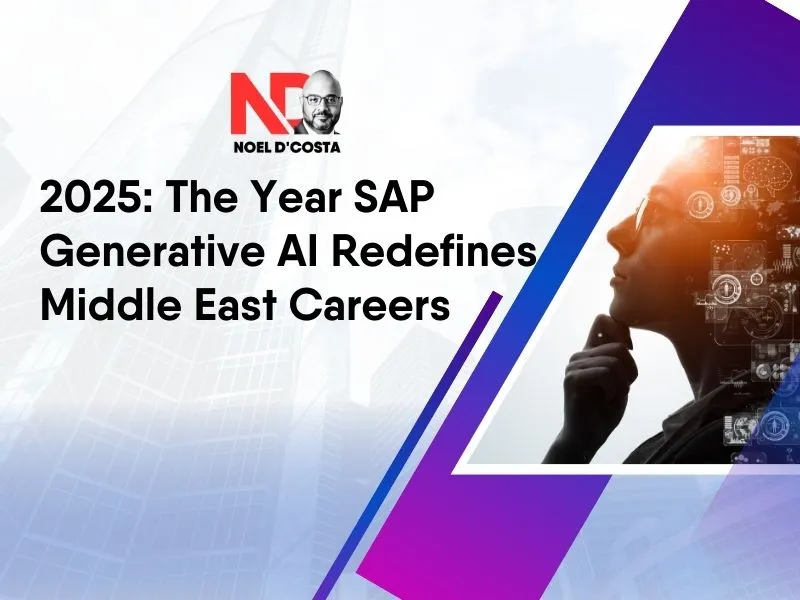





3 Responses